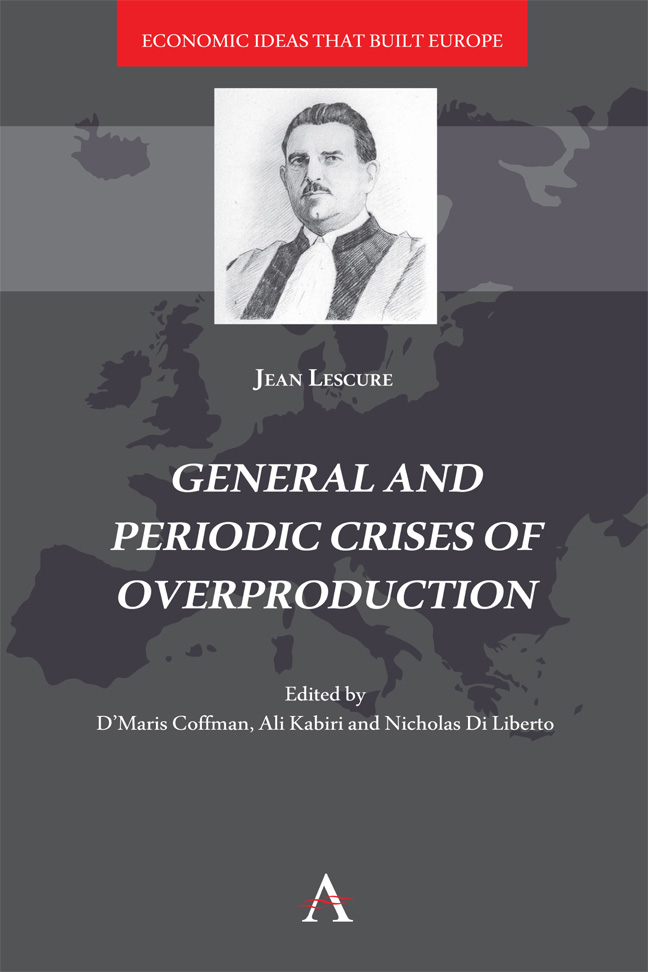Book contents
- Frontmatter
- Contents
- Acknowledgements
- Introduction: Jean Lescure on the Role of Solidarité in Industrial Economies and Among the Social Sciences
- Translator's Note
- General and Periodic Crises of Overproduction
- List of Figures
- List of Tables
- Preface to the Third Edition
- Preface to the Fourth Edition
- Preface to the Fifth Edition
- Volume One The Phenomenon
- Volume Two Causes and Remedies
- Conclusion
- Annexes
- Appendix One Bibliography of the Works Cited by Jean Lescure
- Appendix Two Bibliography of the Works of Jean Lescure
- Index
Chapter Two - The Causes of General Overproduction Crises
Published online by Cambridge University Press: 01 March 2024
- Frontmatter
- Contents
- Acknowledgements
- Introduction: Jean Lescure on the Role of Solidarité in Industrial Economies and Among the Social Sciences
- Translator's Note
- General and Periodic Crises of Overproduction
- List of Figures
- List of Tables
- Preface to the Third Edition
- Preface to the Fourth Edition
- Preface to the Fifth Edition
- Volume One The Phenomenon
- Volume Two Causes and Remedies
- Conclusion
- Annexes
- Appendix One Bibliography of the Works Cited by Jean Lescure
- Appendix Two Bibliography of the Works of Jean Lescure
- Index
Summary
Among the theorists of crises, some focus their observations on the state of circulation and credit and claim to show that the crisis is a monetary phenomenon. Others prefer to consider production, distribution and consumption. We must consider these factors as a whole. The open market policy constitutes quite an interesting novelty.
Section One
Theories Explaining Crises as Monetary Phenomena
Among the theorists of crises, some focus on the drop in prices, following Juglar's classic definition. For them, it is this termination of the price increase that needs to be explained.
As the rise is general, and also the drop, it is tempting to invoke the quantitative theory. But by ‘money’, one could understand metal money, banknotes or deposits. All three have been offered as the basis for the rise and fall of prices.
§1. – Metal money
This explanation of crises was based on facts and doctrine.
The 1857 crisis, which was preceded by a colossal level of gold extraction and an enormous price rise, suggests that general economic crises can be explained by an increase in the stock of metal currency. Schäffle, among others, viewed the rise in prices from 1850 to 1857 as a monetary phenomenon and nothing more.
But because this theory was unable to explain subsequent crises, it was abandoned and seemed to have fallen into oblivion when it was taken up again by Sombart. For him, the crisis of 1900, which occurred after the exploitation of the Transvaal mines; the crisis of 1857; and finally the crisis of 1873, which followed the influx of the five-billion-franc French war indemnity, were confirmation of the causal relationship between the increase in the stock of metal money and general crises.
But how can an increase in the stock of metal cause general or, more precisely, generalized overproduction?
It is a well-known fact that the increase in metal stock leads to a price rise, which in turn stimulates the spirit of enterprise and feverish attempts to benefit from this price rise. The working class, largely employed, receives high wages; the capitalist class nets large dividends. Speculation occurs, and prices climb, thereby stimulating production.
- Type
- Chapter
- Information
- General and Periodic Crises of Overproduction , pp. 353 - 426Publisher: Anthem PressPrint publication year: 2023

